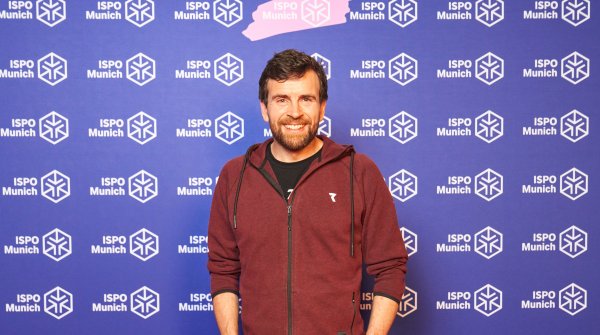With his triathlon around the world, Jonas Deichmann has inspired people all over the world. Ryzon has equipped the adventurer primarily with clothing. Due to the different climate zones, this was a great challenge, says Marketing Manager Sven Schröllkamp. For Siberia, he says, the product team developed a jacket with graphene that was completely tailored to Jonas Deichmann. For Ryzon, the extreme athlete is a stroke of luck and an ambassador for the values to which the company is committed. These include not only an awareness of the environment combined with sustainability aspects, but also the environment. New Work is lived with a 32-hour week and a work-life-health balance.
Sven Schröllkamp: No. The attention Jonas is getting right now is incredible. Jonas, since he's been back, is totally booked. Very exciting. I was in contact with him almost every day during his trip around the world. And I was the one who was able to convince him of us at that time and agreed with him that we would now walk the path together and that we would support him as best we could. When he was on his way from the Northern to the Southern Cape, he had just 13,500 followers. After that we talked on the phone and he told us about his new project of circumnavigating the globe, and he said it could be big.
That's what it has become now...
Yes, mainly because of the whole story in Mexico, where the media made him a sort of a kind of folk hero. The Mexicans have dubbed him Forrest Gump alemán. He's on everyone's lips, wears our clothes 24/7, and of course we benefit from that in terms of attention. Meanwhile, he has 129,000 followers on Instagram. It's still incredible!

As far back as I can remember, this helped a lot in the perception of our brand. We received many attractive inquiries. Mario (Konrad, CEO) gave a lot of interviews at the time and was a guest on podcasts. We communicated the final participation on our product page - that was our triathlon suit (Myth Aero Sleeve Tri Suit), our top product. I believe that a certain trust is built up among the target group.
Love Brand is the more appropriate term. By definition, a Love Brand has an appeal to the target group it wants to address. That's what we try to do by staying true to our standards, living our values and telling stories about the brand.

Our values are deeply rooted. We bring a certain consciousness with us, which we communicate to the outside world, and also live. This means that we deal with ourselves and our environment in a sensible way. This is reflected in projects such as "United in Humanity". We also want to act in an environmentally conscious way. However, the word environment is so big, because we don't just mean the eco-environment, but also our surroundings. And when we deal with it, we do so with heart and soul. That's why we package our values in stories. That's how we become a love brand, because we communicate what we do and what we think is great - which in turn is great for other people. Project Horizon is also about that. We tell stories - away from competitive sports, towards experience, adventure. That's why Jonas Deichmann is a 100 percent fit for us.

We don't have just one USP. That would be too simple. We have three pillars: technology, design, awareness. These are our three communication building blocks on which everything is based. That also makes us strong in the long run, that we don't limit ourselves to one USP, but that we have three pillars.
If we look at the development of the past years, we can definitely say that, yes.
As a brand testimonial, Jan naturally brings a certain trust to the target group. In addition, we can adapt all products based on Jan's feedback and make them even better. That gives us an ideal test object. And so we not only create products that we think are cool, but above all that work. And we get that feedback, first from a Jan Frodeno, from other professional athletes we support, and from our community directly.

Yes, the community that is on Strava is a very valuable target group for us, because they do the sport for which we offer the products anyway. We just had a Strava Challenge with 95,000 participants. The evaluation shows exactly that. We are more of a motivator by setting a goal. If the participants achieve this goal, they receive a reward. They can then redeem it with the brand. I think the Strava platform is a very charming solution for getting in touch with your community and for sustainable community building.
The conflict between functionality, sustainability and design - this is daily bread for our product and design team. We try as best we can to accommodate the three aspects of functionality, sustainability and design in every product. This works very well for most of the products. We have entire product lines that are very functional, and also completely recycled. With the highly technological products, such as our tri-suits, the balancing act and the challenge are much greater.
Yes, I think we've taken a very revolutionary approach to work-life-health balance. We have been working a 32-hour week since May. That's still learning by doing. We'd be lying if we said we've all only worked 32 hours since May; taking two afternoons off is still a process. We are working on it.
In the best case, the reduction in working hours should mean that we can spend more time with ourselves. Many of our colleagues use the time they gain to do more sports. For example, we all have the opportunity to use the benefits of Urban Sports Club - a kind of flat-rate sports provider. Many sports providers are part of the offer. So we can train at many different sports providers, attend classes and keep fit.
In my eyes, home office also plays a big role. At the moment, only those who absolutely have to go to the office should anyway. But even without Corona, we would be free to choose whether or not to work from home.

Yes, when it started in March 2020 with Corona, and people realized after a few weeks of lockdown: We need to get out of the apartment. Suddenly, for example, all the bikes were sold out. The demand was already extremely high, even for us. In addition, Jan Frodeno's Tri@home came in May. We received a lot of media attention. That, coupled with the "United in Humanity" campaign that we launched beforehand, and the increasing demand for endurance sports products anyway, we noticed that. We were lucky that we produce everything in Europe. Otherwise, we would have had supply chain issues. We were able to satisfy the demand for the most part.

We've been cooperating with ClimatePartner for a few months now. They give us the chance to calculate our CO2 emissions and then consider how we want to offset them. We have already offset our emissions for 2020, and are now allowed to call ourselves climate neutral for the year 2020. But in this respect we are just starting out, as with other things.
I don't think we've reached the end of the line on a lot of things at Ryzon. Everything we are currently initiating is actually just at the beginning. That goes from technology to innovation to new work. I'm also thinking of the neo-ecological megatrend, which I don't want to call a trend, but rather the future. A trend always comes to an end, and I just hope that it doesn't stop. And that we will move towards a sustainable future.

- Awards
- Mountain sports
- Bike
- Fitness
- Health
- ISPO Munich
- Running
- Brands
- Sustainability
- Olympia
- OutDoor
- Promotion
- Sports Business
- Textrends
- Triathlon
- Water sports
- Winter sports
- eSports
- SportsTech
- OutDoor by ISPO
- Heroes
- Transformation
- Sport Fashion
- Urban Culture
- Challenges of a CEO
- Trade fairs
- Sports
- Find the Balance
- Product reviews
- Newsletter Exclusive Area
- Magazine







